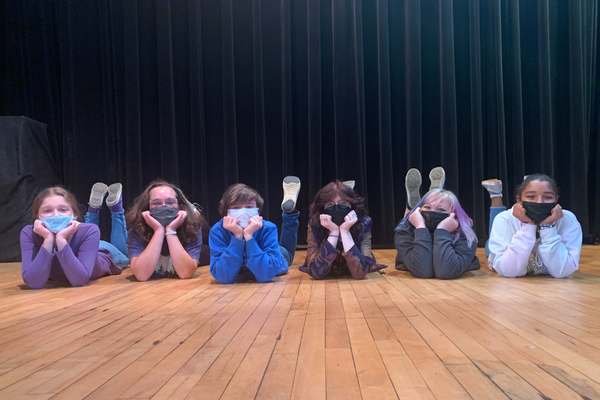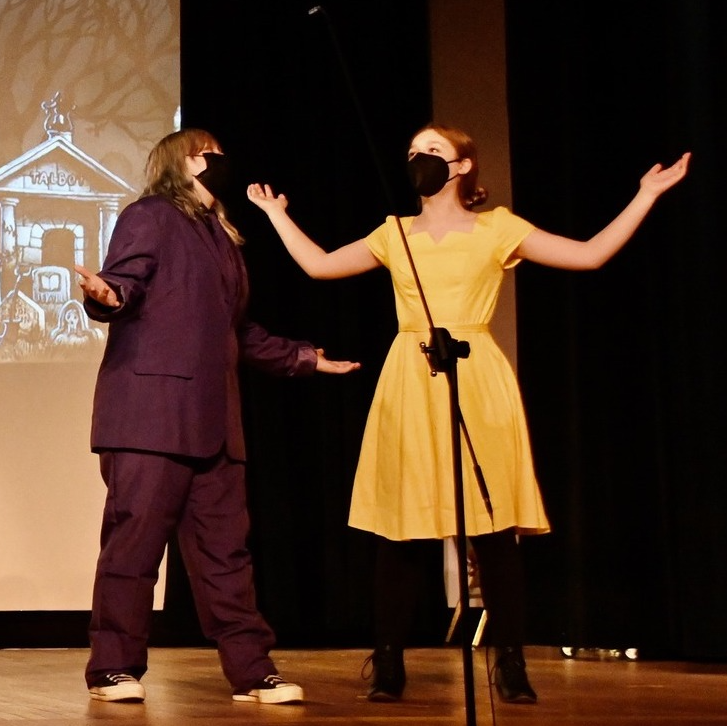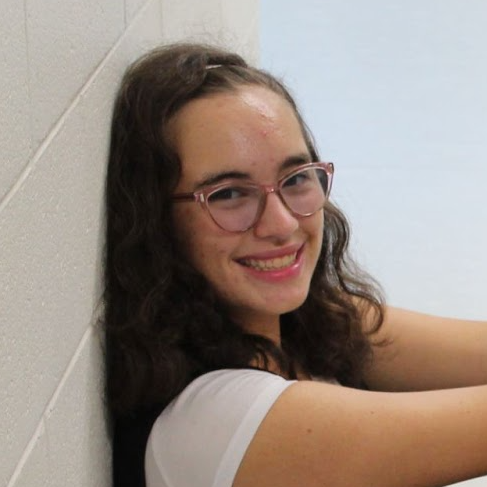By: Kessler (11th grader) & Anna (10th grader) from Empowered Players (EP) and members of EP’s Teen Arts Board (TAB).
This blog post is the second of four in a Youth Performing Arts Series by teens involved in the performing arts. For more posts, please visit our blog.
Highlights:
- Empowered Players (EP) is a Fluvanna-based non-profit in VA designed to make a difference in the community through the arts. Their mission is to uplift the human spirit through access to quality arts experiences, youth empowerment, and community service through free & accessible K-12 theatre education and programming.
- In this Youth Performing Arts Series, youth involved with EP will share more about their experiences and perspectives engaging in the performing arts.
- In this second of four blog posts, Kessler and Anna debunk a few theatre myths and stereotypes that haunt the industry.

There are a lot of stereotypes about theatre kids. Some say we’re anti-social coffee addicts who can’t go anywhere or do anything because “we have rehearsal.” Some say we’re Hamilton obsessed geeks who speak only in showtunes and Shakespeare. Although they might have a point, theatre is much more than the stereotypes.
Theatre, especially Empowered Players, helps budding actors and actresses in many ways. It can improve public speaking ability, increase creative thinking skills, and includes people from many different backgrounds and walks of life through the diverse roles available. And while some theatre stereotypes are true (yes, we are that loud; yes, some of us are that obsessed with Hamilton or Dear Evan Hansen), many are not. This blog debunks a few myths that have permeated the industry for years, especially for youth.
Mythbusting the “Theatre Kid”
To begin with, many people are afraid of theatre because of how it is portrayed in the media. Television and movie producers love to show theatre as something that is filled with gossip and drama, or mean girls and nerds. This does not give theatre a chance! It is an unique art that allows actors to become different people for a few hours a week while boosting beneficial skills such as confidence and public speaking. The myriad perks of theatre are overshadowed by the harmful stereotypes that continue to circulate both within and outside the community. Let’s lay these myths to rest and prove that theatre is truly for everyone!
Debunk: “I can’t, I have rehearsal”
One of the major drawbacks that can dissuade students from entering theatre is the heavy time commitment. Almost everyone has seen or heard the theatre kid meme: “I can’t, I have rehearsal.” And while this can be true (and we have used it to get out of things that we don’t really want to go to), the commitment is no worse than a regular sport. Rehearsals are after school or on the weekends, but many directors are flexible and willing to work with students and their schedules. Since some troupes rehearse on the weekends, afternoons are open for other activities. For example, Anna is in the marching band, which means that she doesn’t have time after school for rehearsals. Since Empowered Players meets on the weekends, she can do both band and theatre. Kessler competes in Forensics through the school, and the weekend rehearsals mean that she has time for homework after school and practice. This is a common occurrence. Many people balance both theatre and other extracurricular activities!
Debunk: “I can only do theatre through my school”
Popular media likes to portray that theatre can only be done through a school (High School Musical, anyone?). While school theatre is definitely an option, it is not the only option. There are many external troupes and programs that allow students to act outside of school hours. These troupes are important because it allows students who don’t go to a traditional school, such as homeschoolers, to experience theatre. There are many community theatre programs that are open to everyone, which opens up theatre opportunities to those who can’ do traditional theatre.
Outside opportunities are also important for those who aren’t comfortable doing theatre through school. Sometimes people have bad experiences with school theatre and are not comfortable going back to school. Community theatre opportunities reopens the door of theatre to those who thought it closed.
Debunk: “I can’t do community theatre because it’s only for adults”

Unfortunately, doing theatre through a community program comes with its own stereotypes. One of the most prominent ideas is that community theatre is only for adults. This is supplemented by many shows that community theatres produce that are not necessarily suitable for teenagers, tweens, or children to act in.
However, many troupes do perform shows that are children-appropriate and sometimes even call for child actors. If someone is interested and there is a community theatre troupe nearby, we suggest reaching out to them and expressing interest. If there is an opening for a child or teen actor, then go ahead and join! If not, then keep reaching out to other troupes and the right one will connect with you! Acting with adults will also increase your skill, since you will be working alongside more experienced actors who can show you some tips and tricks of the trade.
Debunk: “Everyone in theatre already has friends. I won’t be welcome”
The deterrent to many teens in joining new activities is the fear of a clique within that activity that will not accept them. Theatre is infamous for cliquey groups that exclude newcomers, but this is simply not true in most cases. Theatre troupes are welcoming of new actors, especially because more actors means a larger cast. A larger cast means a more in depth and overall fun play. In addition, the people within the groups remember how it felt to be a newcomer to the scene, and as such are welcoming. Theatre, as an art, also attracts kind and accepting people.
Debunk: “Everyone in theatre is dramatic” or “Rehearsals are full of drama”
The final myth that we plan to debunk centers on another name for theatre. Many people call theatre “drama” and this can lead many to believe that actors are backstabbing hooligans, constantly on the lookout for new drama. This is just not correct! Rehearsals are calm places, devoted to the play. While some actors do participate in “backstage drama,” as it is coined, most just want to have a fun show.
Theatre kids also receive an unjust reputation for being “over dramatic.” Seeing as how these people are actors, a certain amount of this is to be expected, but not to the degree that is shown in mass media. The over dramatism is mainly just employed in jokes, and actors know when too much is too much.
Theatre Stereotypes Debunked
Although there are many more myths and stereotypes than what is covered in this blog, we have debunked a few of (what we thought were) the most famous ones that keep youth from entering theatre. An important element to remember is that theatre is not what the media paints it as, and many people from all walks of life enjoy theatre in many different ways. And if acting isn’t something that interests you, that’s okay! Theatre encompasses everything from acting to directing to the technical crew working behind the scenes. All parts are necessary to ensure a successful show. So try out for that musical! Join that community theatre troupe! Take that directing class! Even if theatre is not for you, you will have gained new skills that will benefit you in unexpected but amazing ways.

If you have any comments or questions about this post, please email Youth-Nex@virginia.edu. Please visit the Youth-Nex Homepage for up to date information about the work happening at the center.

Author Bio: Kessler is a junior in Fluvanna County High School. She competes in Forensics through FCHS and participates in the spring shows performed by the high school. She has been involved with Empowered Players for over six years and has worked on many aspects of the theatre experience, from acting in both ensemble and starring roles, to tech, to management and directing. enjoys both acting and directing. This spring, she is excited to star in Peter and the Starcatcher as Molly Aster. This is her first time writing for a UVA blog.

Author Bio: Anna is a sophomore at Fluvanna County High School and has been involved with theatre since the summer before 4th grade. She did the initial Empowered Players summer camp, and has been involved with the program since. She has been in numerous shows, as well as camps, and has learned theatre management, directing, script writing and playwriting through those camps. She has just wrapped up her latest show, in which she played Alice in the Addams Family Musical. She also did her first mentoring volunteer work with Empowered Players in the Rudolph Musical this past semester.